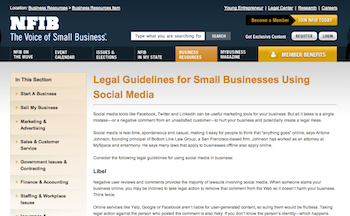I was pleased to contribute to NFIB‘s online collection of business resources regarding legal issues in social media. The National Federation of Independent Business is the leading small business association representing small and independent businesses, a vigorous advocate for entrepreneurs. I’ve reproduced part of the article below, and a link to the original can be found here, along with many other resources for entrepreneurs and small business owners. Thanks to Elizabeth Cotner for the interview.
Legal Guidelines for Small Businesses Using Social Media
Social media tools like Facebook, Twitter and LinkedIn can be useful marketing tools for your business. But all it takes is a single mistake—or a negative comment from an unsatisfied customer—to hurt your business and potentially create a legal mess.
Social media is real-time, spontaneous and casual, making it easy for people to think that “anything goes” online, says Antone Johnson, founding principal of Bottom Line Law Group, a San Francisco-based firm. Johnson has worked as an attorney at MySpace and eHarmony. He says many laws that apply to businesses offline also apply online.
Consider the following legal guidelines for using social media in business:
Libel
 Negative user reviews and comments provoke the majority of lawsuits involving social media. When someone slams your business online, you may be inclined to take legal action to remove that comment from the Web so it doesn’t harm your business. Think twice.
Negative user reviews and comments provoke the majority of lawsuits involving social media. When someone slams your business online, you may be inclined to take legal action to remove that comment from the Web so it doesn’t harm your business. Think twice.
Online services like Yelp, Google or Facebook aren’t liable for user-generated content, so suing them would be fruitless. Taking legal action against the person who posted the comment is also risky. If you don’t know the person’s identity—which happens often when someone posts under a username—you may be able to use the subpoena power of the courts to ask the service to reveal the user’s identity. But these kinds of lawsuits often leave business owners at a dead end. “They’re expensive, time-consuming and the damage is already done,” Johnson says.
As an alternative, Johnson suggests cultivating a following of online fans who will evangelize for you and defend your business against negative comments.


